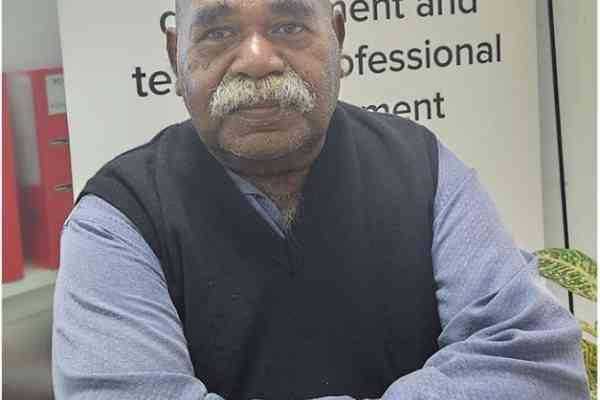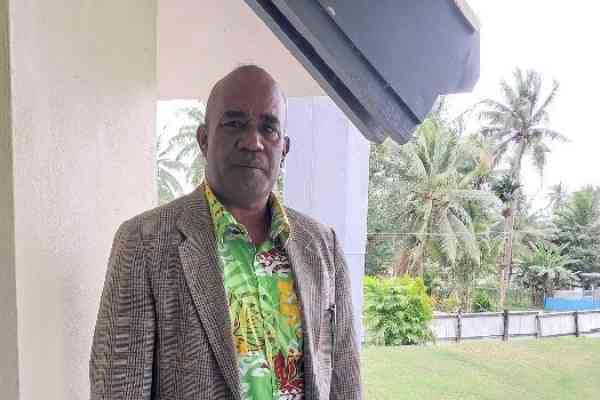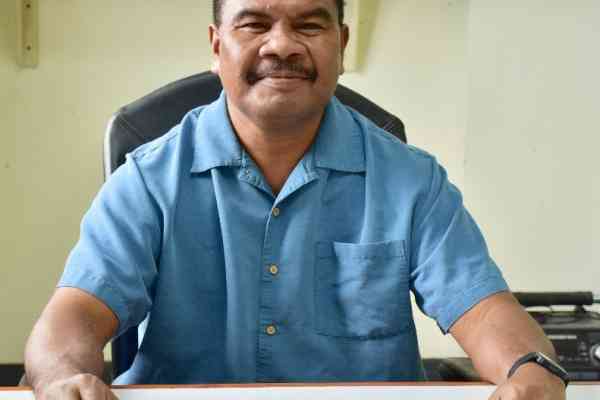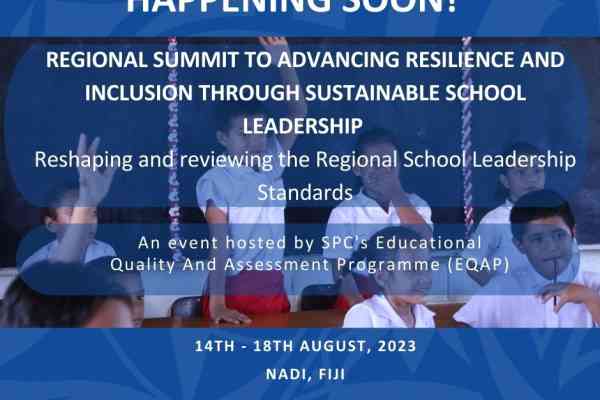(Contenu disponible en anglais uniquement)
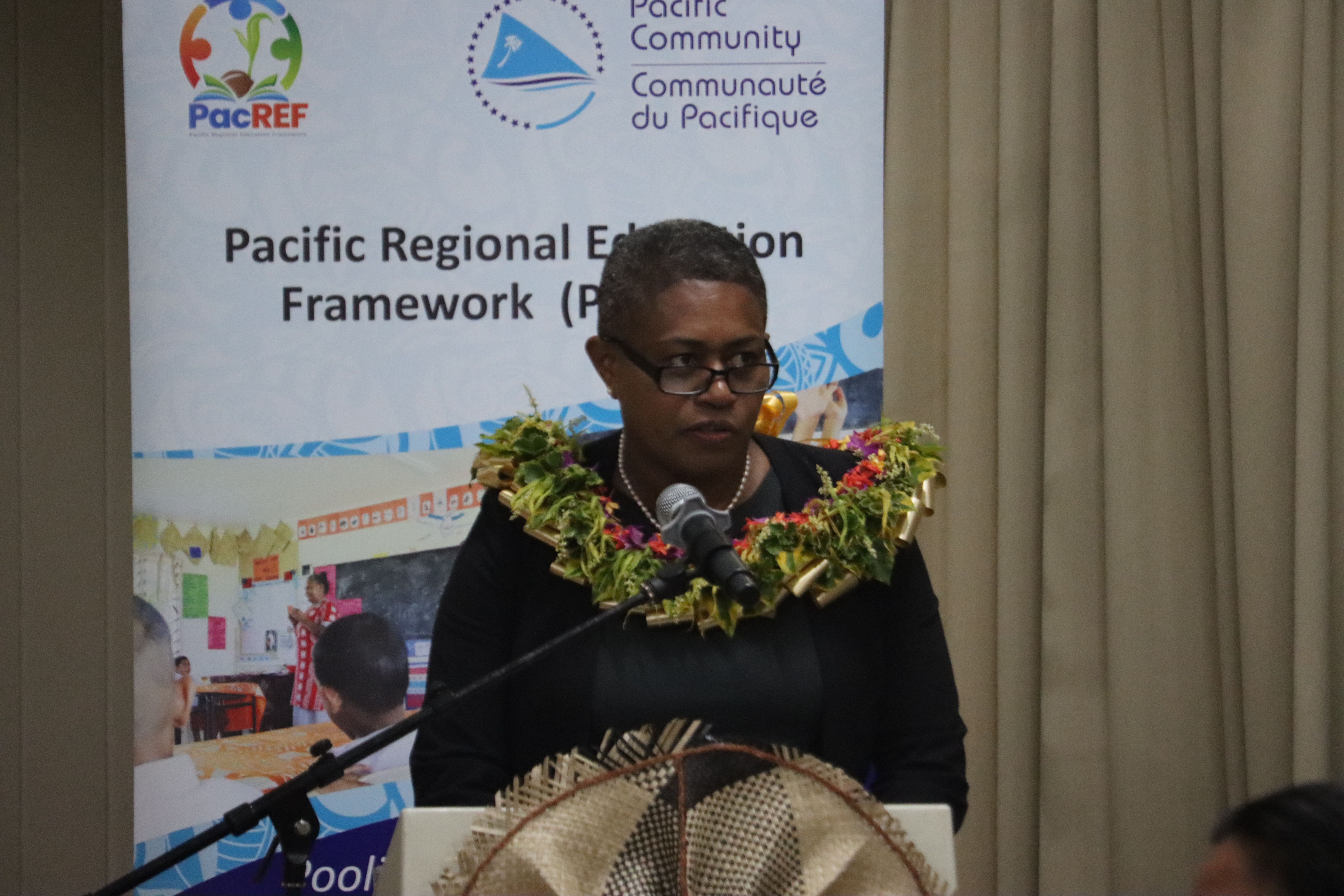
The Director Education Quality & Assessment Program of the Pacific Community - Ms. Michelle Belisle
The Deputy Vice Chancellor of the University of the South Pacific
The representatives of the Pacific Community SPC
Regional School Leaders
Invited guests
Representatives of the Media
Ladies & Gentlemen
Bula Vinaka and a Very Good Morning to you all.
This verse reminds us of the importance of approaching each role or action with the appropriate attitude and dedication, focusing on benefitting others and contributing positively to their lives. It underscores the value of selflessness and a caring approach in whatever roles we take on.
Thank you Madam Director for the invitation and the warm welcome.
Ladies & Gentlemen, It gives me immense pleasure as the new Permanent Secretary for Education to be the chief guest for the opening of this important Regional Education Leadership Summit.
It has been a decade now since the establishment of the Regional Education Leadership Summit (RELS) and I pay my tribute to the Regional Education Ministers, who in 2007 following the collective concern over the declining trends in students achievements in the region, drafted this regional commitment that would define the role of school principals and to make explicit the role of quality school leadership in improving learning outcomes. This foresight set the standard for Quality Leadership to ensure Quality education.
Events as such, ladies & gentlemen, ought not merely serve the purpose of meeting but rather, should convene with the specific intent of scrutinizing our objectives, the milestones we have attained so far, and the underlying factors contributing to our unfulfilled aspirations. I urge you to use this meeting to identify and take your role as a transformative leader for your country and for our region. This then requires a combination of vision, strategic thinking, collaboration, and effective implementation. You must carefully consider that as a Pacific region we have a unique set of challenges and opportunities due to the region's diversity, geographical dispersion, and cultural richness. It is only with this consideration as a “kai Pasifika” that we can then derive the impetus to undertake essential remedial measures as we plan and progress ahead
The two founding reasons that led to the establishment of this forum in 2007, and finally its endorsement by Education Ministers in 2012, was first the declining trend in students achievement, and secondly, the increasing proportion of school dropouts without acquiring the basic knowledge of literacy and numeracy.
Change is unavoidable, and to remain aligned with the ongoing changes, the Ministry of Education strongly believes in reviewing current policies and guidelines.
For this reason, I urge you all, as well as those who hold an interest in our children’s education to exercise careful discernment when making decisions.
Ladies& Gentlemen, it is crucial to bear in mind that education is fundamental. I am optimistic that we can provide our children with an educational framework that not only cultivates a stronger understanding of their unique identity but also equips them for life-long learning.
Standard for Regional School Leadership
The tireless effort of the Education Ministers in our region, and through the very able technical support of you our regional partners has led to the establishment of the regional school leadership standards with the two main objectives of defining the role of school principals as well as quality school leadership standards.
Ladies& gentlemen, the standard serves as a guiding reference, akin to a compass, for school leaders in matters of skills, knowledge, and attitude. It required five years for the standard to gain endorsement from relevant stakeholders, thus becoming a blueprint for Pacific School Leaders demanding quality leadership for a new era of the Pacific as far as education is concerned.
Four Core Pillars of RSLS
The pillars of the Regional School Leadership Standards (RSLS) is built upon four pillars that necessitate collaboration to enhance learning outcomes. It is akin to a four-legged stool, with each pillar being equally vital. Should one pillar falter or be absent, it jeopardizes the integrity of leadership quality, prompting doubts and challenges.
This RSLS is modelled to a house, representing the unity and bond between a school leader, their staff, students, parents, and the community. It is important to note, that this framework, acts as the sturdy base of this interconnected structure. Hence, it is important for you as leaders to think strategically and develop foresight, compassion and empathy to effectively fulfil your role as a competent, strategic, just and virtuous leader.
Importance of the Summit
Ladies & Gentlemen, the importance of these Standards cannot be overstated, and for this, I commend the past and current school leaders for their resilience in managing various challenges, including natural disasters, such as the cyclones and earthquake in Vanuatu, the public health emergencies (such as the COVID19 across the world; the measles Outbreak in Samoa) , or the cultural shifts, digital advance, and global risks brought on by climate change, rising prices and fluid markets. Those that have gone before you, have admirably held their ground in the face of these multifaceted obstacles, I have no doubt that you will not only rise to the challenge but also exceed expectations.
I believe that this summit has arrived at an opportune moment to reassess the standards established a decade ago. I’m confident that every participant in this summit will make a valuable contribution, fostering positive transformations for more capable and proficient school leadership.
Ladies and gentlemen, let us bear in mind that new challenges arise daily, impacting our children. It is incumbent upon school Leaders to establish a learning- and learner-conducive environment that safeguards the well-being and development of our young individuals.
On this note, I’d like to emphasize the urgency of improving our children’s literacy and numeracy rates. It’s disconcerting that a significant number of non-readers exist in both primary and secondary schools. As leaders, your role in identifying students who require intervention programs is important. Identify them early through an integrated health and education system, call on your colleagues across the sectors, seek clarity, be child centered, be a teacher and be teachable – be the transformational leader.
Addressing the issue of low literacy levels is a collective responsibility. I encourage you to engage with parents, guardians, and communities to devise effective strategies, starting from pre-school stage, ensuring that as students transition up the ladder, they are confident and fluent readers. Research has continued to reaffirm that a child that is read to and continues to read for 20 – 30minutes/ day is statistically more likely to succeed and thrive, compared to the child that is not exposed to reading. I quote Albert Eisten who said “ if you want your child to be intelligent, read them fairytales, if you want them to be more intelligent, read them more fairytales,” (unquote) . Let us be that leader, who starts the reading at home and systematically integrates it into their classrooms, schools and institutions.
In addition to reading, I am excited about the reinstatement of vocational technical schools by our Coalition government here in Fiji. This needs to be filtered down to our students and parents. Unfortunately, there persists a prevailing notion that such Technical and Vocational Education and Training (TVET) is of lesser value. You and I, must work together to shift this mindset and socialize the prospectus that TVET is a viable real solution for our students and indeed our young adults. I task all partners at this forum to invest in the TVET sector. From an education perspective, social, economic and indeed a mental health perspective – TVET, the teaching of vocational, technical and life skills has shown to decrease the sense of helplessness in young people by giving our students a sense of hope, a viable career path and is a real choice for life skills and eventually a trade.
As a Pacific People, I admire the special connection we share and our ability to work effectively with our Partners across the globe, let us use this connection to exploit the vibrant ideas we collectively bring together to set the standard for school leaders planning and implementing strategies for a bright future for our children.
This regional Education summit offers a chance to assess the existing state of our education system comprehensively. It will serve as a platform to recognize areas of deficiency, challenges, and potential strategies that can drive the progress of our education system in the future. Leave this summit with some very tangible outcomes, that is unique to the region and can be contextualized to your country.
The Fijian Ministry of Education, like the Ministries of Education across the region, anticipates the ongoing support of all of you our technical partners, in ensuring the success of this event. Our collective aim is to witness an increasing number of children enrolled in schools, persisting in their education, and successfully completing their studies.
Ladies & gentlemen, it is about making informed decisions that will impact the teaching and learning in your individual schools. I say again, “If it is in serving, then serve well; if it is teaching, then teach well; if it is to encourage, then give encouragement; if it is giving, then give generously; if it is to lead, do it diligently; if it is to show mercy, do it cheerfully.”
I wish each one of you the very best and I am positive that this summit program will provide you our Education leaders from our region, with the opportunity to learn, teach, support and develop a robust framework that is transformative. During this Summit, continue to ask the question “ What can I do as a Education Manager, Principal, as a school leader to help my school, and my students cope with what has happened and what is to come?” As you endeavor to answer this question – Think Globally Act Locally.
I challenge you all to Build a Regional School leadership Standard that is World class, that is Transformative. With those few words, I now officially declare the 2023 Regional Education Leadership Summit Open. Technical teams, advisers and you our School Leaders - Do well, be well, for your region, your country, your institution and for your students.
Thank you & Vinaka Vakalevu
